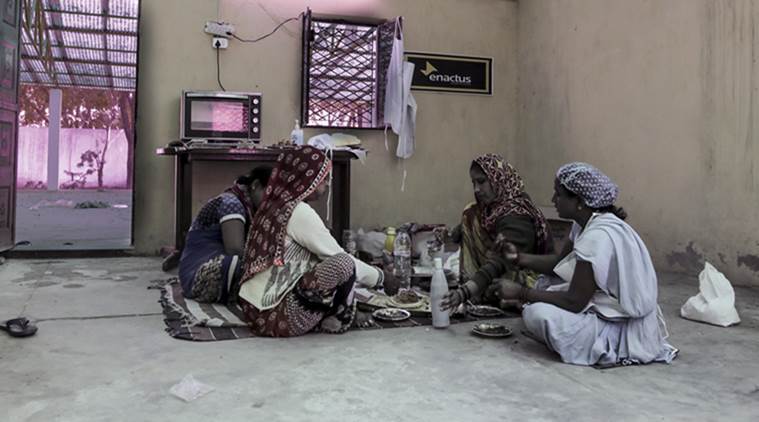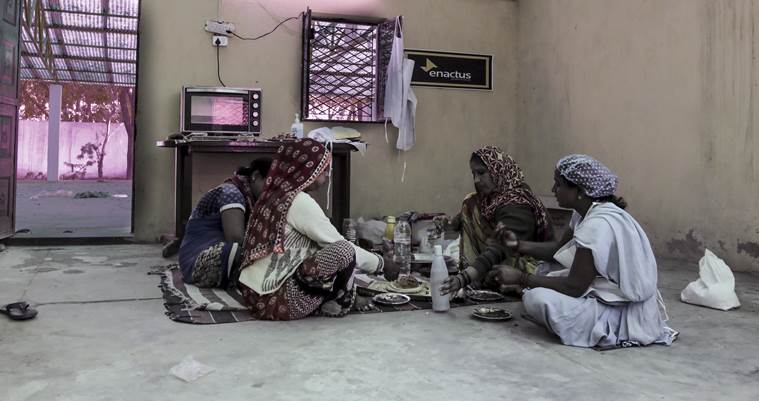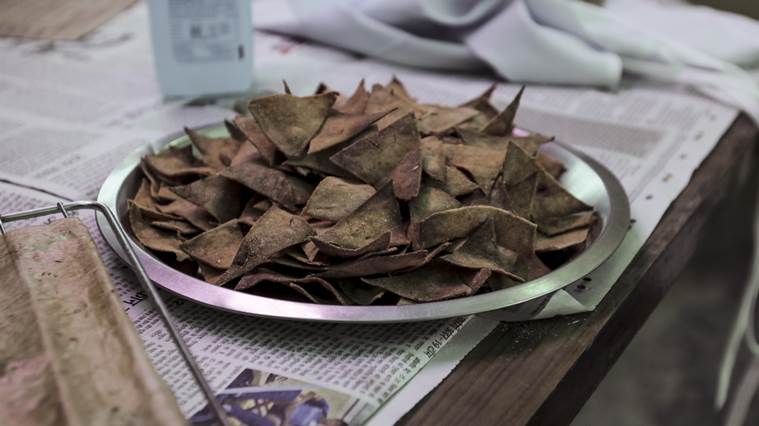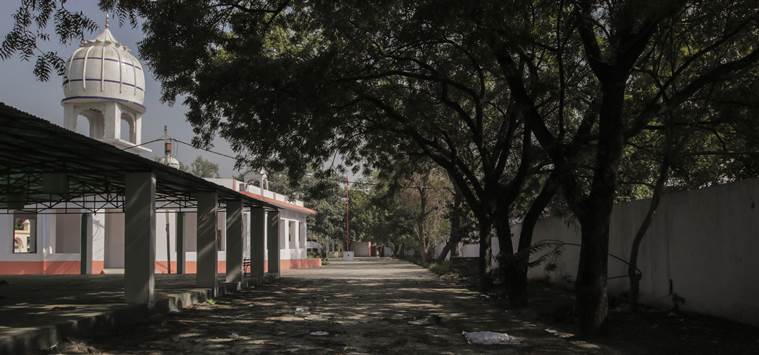 The women are part of project ‘Utkarsh’ run by the Enactus Society (Entrepreneurial, Action, Us) of Aryabhatta College, Delhi University.
The women are part of project ‘Utkarsh’ run by the Enactus Society (Entrepreneurial, Action, Us) of Aryabhatta College, Delhi University.
Rushing across the long gallery at the Ravidas Camp in RK Puram, Chanda Srivastava, joins her co-workers. The group of four women occupy a gloomy room adjacent to a long hallway. The scent of roasted and baked chips is heavy in the air. Chanda now has an apron and has tucked her hair under a cap. She sits down to knead the dough. The others in the team are chipping in by grating carrots and beetroot, slicing the dough and finally baking the slices to make chips, sold under the brand name ‘Veggitos’.
The women are part of project ‘Utkarsh’ run by the Enactus Society (Entrepreneurial, Action, Us) of Aryabhatta College Delhi University. The learning platform has a group of student entrepreneurs working on multiple social causes.
Started in October 2017 with three production units across the capital, the underlying idea of Utkarsh is to ultimately make the production unit self-sustained and independent. However, two of the initially independent production units were shut while one remains temporarily closed.
The Ravidas camp production unit came into existence in October 2019. The makeshift room-cum-workplace at Ravidas camp is currently being run by the four ‘women entrepreneurs’ – Chanda Sharma, Chanda Srivastava, Anardevi and Angoori — and is equipped with basic utensils and an oven.
“We get at least 2-3 orders per week and then we segregate the work among us. We recently delivered 11kgs of chips within a span of two days,” says Chanda Srivastava. The team is now working on another 5-kg order for Gargi College’s Enactus fest the following day.
 Chanda Sharma, Chanda Srivastava, Anardevi and Angoori are the four women employed under Project Utkarsh.
Chanda Sharma, Chanda Srivastava, Anardevi and Angoori are the four women employed under Project Utkarsh.
Opening one of the packets of beetroot pulp, Angoori says, “The pulp is procured from a juice vendor and the juices have already been secreted out. The chips might not have the flavour of beetroot”
Sustainable use of vegetables is one of the main objectives of Project Utkarsh. The chips include leftover and unsold carrot and beetroot pulp from the juice vendors. The other objective, of course, is to offer a fat-free snack along with generating employment for underprivileged women.
Sarthak Malhotra, vice-president, Enactus Aryabhatta College, tells indianexpress.com: “These middle-aged women needed employment. They had been cooking throughout their lives. Why can’t we convert this extremely useful skill of cooking to a money-making business?”
 The chips are baked and the ingredients include reused carrot and beetroot pulp.
The chips are baked and the ingredients include reused carrot and beetroot pulp.
Chanda is happy with the employment opportunity extended through the making of a simple delicacy and the benefit of the production unit being very close to her house. “People around me appreciate my work, my husband says I should continue working here, it adds extra income to my family”.
The chips are sold at a price of Rs 60 which includes Rs 40 as fixed cost, Rs 5 is retained as earnings and Rs 15 is distributed among the women. Sarthak Saxena, financier for Enactus Aryabhatta, says they get consolidated funds from different sources including corporates and from the stalls they put up. “We are under the CSR ambit of IFFCO and Prasuk Organics and get corporate sponsorship from them.”
 A small room at the Ravidas camp at RK Puram provides income-generating opportunity to underprivileged women.
A small room at the Ravidas camp at RK Puram provides income-generating opportunity to underprivileged women.
A similar production unit is being set up in Munirka where the women have started interacting with the new employees. They will be imparting basic training knowledge related to production and packaging of these chips which were earlier done by the students.
“This is the incubation period for the Ravidas camp production unit as well,” Malhotra explains. “We are getting these women orders, procuring the ingredients for them, arranging for transportation. Once this business model is fully functional and operating at its full capacity, we would be wanting the women to operate this unit independently. This is how we would make these women, ‘entrepreneurs’. I am confident that the production unit will be self-sustained by the end of June 2020,” he adds.